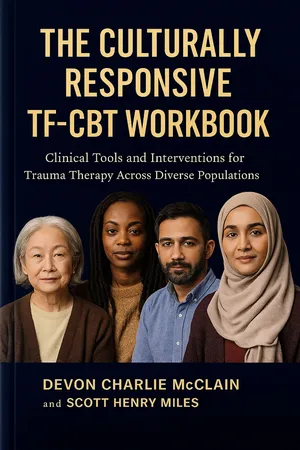
The Culturally Responsive TF-CBT Workbook
Clinical Tools and Interventions for Trauma Therapy Across Diverse Populations.
- English
- ePUB (mobile friendly)
- Available on iOS & Android
The Culturally Responsive TF-CBT Workbook
Clinical Tools and Interventions for Trauma Therapy Across Diverse Populations.
About this book
Transform Your Trauma Practice with Evidence-Based Cultural Adaptation
Mental health professionals face a critical challenge: delivering effective trauma treatment to increasingly diverse client populations while maintaining clinical excellence. Standard TF-CBT training provides powerful tools, but cultural adaptation often feels like guesswork. This systematic workbook bridges that gap.
Comprehensive Framework for Culturally Responsive Trauma Treatment
This professional workbook provides mental health clinicians, therapists, counselors, and social workers with practical tools to adapt Trauma-Focused Cognitive Behavioral Therapy across cultural contexts. Moving beyond surface-level cultural awareness, you'll gain concrete strategies for integrating cultural wisdom with evidence-based practice while maintaining treatment fidelity.
What You'll Find Inside:
Systematic cultural assessment protocols that capture trauma within cultural, historical, and intergenerational contexts
Adaptation frameworks for each TF-CBT component—psychoeducation, cognitive processing, trauma narratives, exposure techniques, and skills training
Population-specific guidance for refugee and immigrant families, Indigenous communities, LGBTQ+ individuals, and other marginalized populations
Ready-to-use clinical tools: cultural formulation templates, assessment instruments, client worksheets, family engagement protocols, and intervention planning guides
Supervision and training curricula including an 8-week cultural competency program, case consultation formats, and bias examination exercises
Organizational implementation strategies for creating culturally affirming clinical environments and measuring culturally valid outcomes
Specialized Clinical Applications:
Working with refugee trauma? Learn to address pre-migration, transit, and post-migration experiences while navigating acculturation stress. Serving Indigenous clients? Discover how to respectfully integrate traditional healing practices, work with elders, and address historical trauma. Supporting LGBTQ+ individuals? Implement minority stress frameworks and chosen family interventions.
Evidence-Based Yet Culturally Grounded
This workbook synthesizes research from cultural adaptation studies, TF-CBT effectiveness trials, and community-defined healing practices. You'll understand which adaptations enhance outcomes, how to balance flexibility with fidelity, and when to integrate traditional healing approaches with conventional therapy.
Practical Tools for Immediate Application:
Every chapter includes detailed case studies, step-by-step exercises, reproducible worksheets, and implementation roadmaps. From your first culturally diverse client to building organizational cultural responsiveness, these tools support your professional development at every stage.
Who This Book Serves:
Licensed therapists, clinical psychologists, clinical social workers, professional counselors, marriage and family therapists, school counselors, and trauma specialists seeking to enhance cultural responsiveness. Ideal for clinical supervisors training staff, agency administrators implementing culturally affirming practices, and graduate students in psychology, social work, and counseling programs.
Frequently asked questions
- Essential is ideal for learners and professionals who enjoy exploring a wide range of subjects. Access the Essential Library with 800,000+ trusted titles and best-sellers across business, personal growth, and the humanities. Includes unlimited reading time and Standard Read Aloud voice.
- Complete: Perfect for advanced learners and researchers needing full, unrestricted access. Unlock 1.4M+ books across hundreds of subjects, including academic and specialized titles. The Complete Plan also includes advanced features like Premium Read Aloud and Research Assistant.
Please note we cannot support devices running on iOS 13 and Android 7 or earlier. Learn more about using the app.
Information
Table of contents
- The Culturally Responsive TF-CBT Workbook
- Table of Contents
- Chapter 1: Cultural Trauma in Context
- Chapter 2: Evidence Base for Cultural Adaptation
- Step 1: Cultural Assessment
- Step 2: Problem Formulation
- Step 3: Treatment Selection
- Step 4: Implementation Planning
- Chapter 3: Two-Eyed Seeing - Integrating Healing Traditions
- Step 1: Cultural Analysis
- Step 2: Clinical Analysis
- Step 3: Ethical Analysis
- Step 4: Partnership Analysis
- Step 5: Implementation Planning
- Chapter 4: Comprehensive Cultural Assessment Strategies
- Step 1: Basic Cultural Information
- Step 2: Cultural Identity Mapping Create a visual map showing:
- Step 3: Cultural Resources and Stressors Map positive and negative cultural factors:
- Step 4: Family Cultural Patterns Assess cultural factors within family system:
- Step 5: Treatment Planning Integration Use culturagram information for treatment planning:
- Step 1: Basic Genogram Construction
- Step 2: Migration and Cultural History Add migration and cultural information:
- Step 3: Cultural Identity and Practices Map cultural identity across generations:
- Step 4: Acculturation Patterns Show acculturation differences:
- Step 5: Cultural Strengths and Resources Identify cultural protective factors:
- Chapter 5: Building Therapeutic Relationships Across Cultures
- Chapter 6: Psychoeducation Through a Cultural Lens
- Step 1: Cultural Background Assessment
- Step 2: Trauma Conceptualization
- Step 3: Metaphor Development
- Step 4: Metaphor Testing
- Step 1: Explore Cultural Beliefs
- Step 2: Find Common Ground
- Step 3: Address Conflicts Respectfully
- Step 4: Develop Integrated Approach
- Chapter 7: Cognitive Processing Across Worldviews
- Step 1: Identify the Situation and Thoughts
- Step 2: Cultural Values Clarification
- Step 3: Values-Thought Alignment Assessment
- Step 4: Alternative Thoughts Generation
- Step 5: Implementation Planning
- Chapter 8: Creating Culturally Meaningful Trauma Narratives
- Step 1: Cultural Background Assessment
- Step 2: Narrative Preference Exploration
- Step 3: Historical Context Integration
- Step 4: Cultural Values Integration
- Step 5: Community Resources Assessment
- Chapter 9: Exposure and Desensitization Considerations
- Chapter 10: Skills Training Through Cultural Practices
- Chapter 11: Refugee and Immigrant Populations
- Chapter 12: Indigenous and Native Communities
- Chapter 13: LGBTQ+ and Gender Diverse Clients
- Chapter 14: Clinical Supervision and Training
- Chapter 15: Organizational Cultural Responsiveness
- Chapter 16: Program Evaluation and Outcomes
- Reference